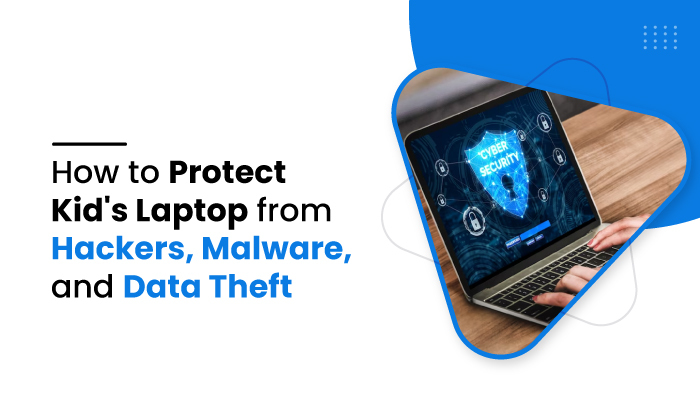How to Protect Kids Laptop from Hackers, Malware, and Data Theft

How to Protect Kids Laptop from Hackers, Malware, and Data Theft
It’s hard to ignore the fact that phishing, malware, ransomware, and other digital threats are everywhere. Additionally, they have become more sophisticated as well. As a result, we are facing different types of risks each day including extortion, identity theft, data destruction, and others. That is why you have to take some steps to protect your kids laptop from hackers and cybercriminals along with computers. Here, we are going to provide you with some tips on how you can protect their devices. No need to worry since you don’t have to be an expert to understand these hacks.
First, you have to consider securing your devices physically. Lock your laptop, computer, and mobile phone when not in use. Obviously, you should never leave your device unattended. Don’t forget to disable your Bluetooth and lock-screen notifications since this could be used by thieves in accessing your device’s system. The following tips can help you to protect your kids laptop from hackers, malware, and other cyber threats.
Use a Secure Network
One of the ways that hackers can access your kid’s laptop or computer is through the internet. So be sure to use SSL/TLS when connecting to websites and secure devices that include overly permissive factory-default settings such as routers, IoT devices, and others.
Enable Firewall
A firewall manages the flow of data between the internet and your kid’s laptop, which is much the same as a router. It can prevent the exposure of your private data by making a gateway. Additionally, it can warn you in case there are suspicious persons attempting to access their computer system. You should also know how to protect Android smartphones.
A built-in firewall is usually included in some operating systems such as macOS and Windows. Most routers also come with built-in firewalls. So, you don’t have to worry about installing one since your device is already protected. What you can do is toughen your computer security by using a strong password for locking your firewall, in case someone might try to disable it.
Install Antispyware and Antivirus
One of the crucial steps in protecting your laptop is to install antivirus and keep it up to date. Protect your laptop with good antivirus. It can help in detecting, preventing, and removing malware and other type of viruses. Keep in mind that your laptop or computer could be vulnerable to malicious software developed by cybercriminals. Additionally, you can also download and install an antivirus app on your smartphone and keep it up to date as well.
Get Rid of Any Unnecessary Software
Hackers can attack your laptop by taking advantage of your software vulnerabilities. Furthermore, if you only have less software, then the less vulnerable your device will be. Hence, it would be wise to get rid of unnecessary software on your laptop once you have confirmed that it is safe to remove them. Consequently, you should also cancel unimportant default features and disable unnecessary services to reduce the risk of any cyberattacks.
Choose a Secure Web Browser
Usually, new computers are installed with web browsers, however, they do not have secure settings. Hence, it is critical that you should secure your browser to help in improving your laptop’s security since most cybercriminals are taking advantage of web browsers. Always ensure that you are using a trusted web browser and avoid non-essential plugins/add-ons.
Update More Often
Most often, updates for software are released to fix its flaws, bugs, and vulnerabilities. Unfortunately, these flaws can be uncovered by hackers. That is why it is essential to keep your software updated all the time. Keep in mind that there are also vulnerabilities found in the firmware. This software is responsible for providing additional functionalities to your devices such as the connection between your device and the headphones, microphone, or printer. Simply turn on automatic updates so you don’t have to worry about this.
Use Strong And Unique Passwords
It is important to know that password is the ultimate defense against any intrusions. It is very easy to set up and you don’t have to spend money on it. However, this can only be effective if you carefully follow the basic rules.
Apply Two Factor Authentication
Aside from creating a strong password, you can add another layer of protection by applying two-factor authentication. Most websites are using this to restrict access and secure your account. Although it could delay your connection, however, it has tremendous benefits.
Be Aware of Cyber Attacks
Educating yourself about ransomware, phishing, and other type of cyber attacks is the best defense for protecting your device and preventing hackers from accessing your laptop or computer. Do some research to learn how you can detect and avoid them.



 WhatsApp Spy
WhatsApp Spy Facebook & Messenger Spy
Facebook & Messenger Spy Viber Spy
Viber Spy Instagram Spy
Instagram Spy Skype Spy
Skype Spy TikTok Spy
TikTok Spy Telegram Spy
Telegram Spy LinkedIn Spy
LinkedIn Spy Twitter Spy
Twitter Spy Youtube Spy
Youtube Spy Photo Spy
Photo Spy Video Spy
Video Spy Calls and Contacts Tracking
Calls and Contacts Tracking SMS & IM Chats
SMS & IM Chats Voice Capture
Voice Capture Image Capture
Image Capture Video Record
Video Record